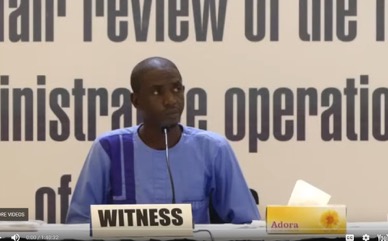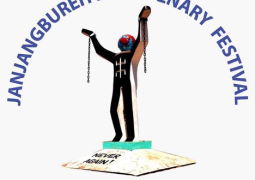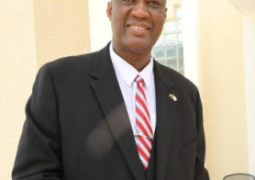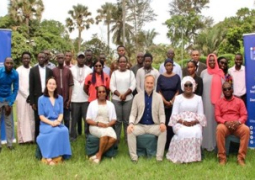
Modou Lamin Sanyang served as the ward councilor for Wassadu in the Foni Jarrol District, which falls under Brikama Area Council’s (BAC) jurisdiction, from 2018 to 2023 and was re-elected for a second term.
He was a member of the Finance Committee and the vice chairperson of the Education Committee. The witness was bombarded with questions about the controversial “Salibo’ allowance. He said the amount they used to receive was decided by the management and not the council.
“They will only call us to come and receive it,” he testified.
Mr Sanyang said he received an honorarium and not Salibo, though the finance director of Brikama Area Council had previously admitted that there was no such allowance as honorarium in the Financial Manual, thus acknowledging the illegality of such payment.
Alagie Jeng, the director of finance, had also said that there was no work done to warrant the payment of the so-called honorarium, and instead it was the decision of the chairperson to support the councilors during the Koriteh and Tobaski.
Mr Sanyang’s insistence persisted, while at the same time saying that he would not dispute the testimony of the director of finance.
Lead Counsel Patrick Gomez referred him to his own statement in which he stated that the Salibo allowance, which had been stopped by the new leadership of the council, was given to them as support during the Koriteh and Tobaski.
Mr Sanyang testified he was aware that some of his fellow councilors approached ex-Chairperson Sheriffo Sonko for the payment of the allowances, but added that he was not part of it. Despite his voluntary admission, the ward councilor was argumentative and still argued that it was an honorarium and not Salibo allowance, contradicting the testimonies of a number of previous witnesses that included councilors and the BAC director of finance.
Chairperson Jainaba Bah at some point intervened, questioning the witness about his knowledge of the Financial Manual for Local Government. Sanyang said he had never read the Financial Manual. He was also referred to the testimony of the director of finance, who stated outright that there is no provision in the Financial Manual for payment of honorarium. Sanyang was also referred to the manual to read.
The confrontational witness took another line of argument, focusing on a budget line for the payment of honorarium. The Commission ordered him to provide the budgets of BAC from 2018 to 2023 and provide an explanation to justify the payments he received. He was tasked to do that next week Tuesday.
The witness was given a voucher, which was already in evidence, and he was asked to mention the voucher number. He responded that he did not know what a voucher number was. He was shown the voucher number, and he read it. It was the payment of D288,000 to the councilors. The witness was paid D8,000 and this was on 13 August 2018.
Counsel Gomez asked, “What service do you render to warrant the payment of this allowance?”
“The service I rendered,” he responded, “is the assessment I conduct at my community level.”
“Why are you paid every year at the same time and the same period (Koriteh and Tobaski)?” the lead counsel asked him again, but the latter did not respond specifically to this.
Quizzed whether it was the management that determines their allowances, he said it is the Ministry of Local Government and Lands.
“If any other person determines your allowance, will that be lawful? The lead counsel asked again and got a positive answer.
The witness was referred to section 27 of the Local Government Act regarding payment of allowances. It provides that “the Secretary of State (Minister) shall, by regulations, determine allowances and any other benefits which shall be paid by a Council to its members”.
Vice Chairperson of the Commission, Samba Faal, who served as a Mayor of Banjul City Council for a decade, among other key portfolios in councils, told the witness that the councilors were not entitled to the payment they were receiving.
“Anything you do is pro-bono. You are a councilor and that is why you are paid an allowance. You are not part of the establishment. That is why the Ministry approves your allowances,” Commissioner Faal told Sanyang.
Commissioner Faal emphasised that councilors are not staff of the council, and therefore they are not entitled to any other payment other than the approved allowances by the Ministry.
The witness agreed and admitted that the allowances and other benefits should be determined by the Ministry. Despite the admission, he insisted that their budget has a line for payment of honorarium.
Witness Sanyanng was handed a file containing meeting minutes of the Finance Committee. He confirmed that the file was the Finance Committee meeting minutes. He was asked if there were any meeting minutes concerning the assessment he claimed they did as a service to the council, but he could not show anywhere from the records that his committee conducted such an exercise.
Sanyang then stated his Committee did not write but approached the council chairperson verbally, informing him about the honorarium.





